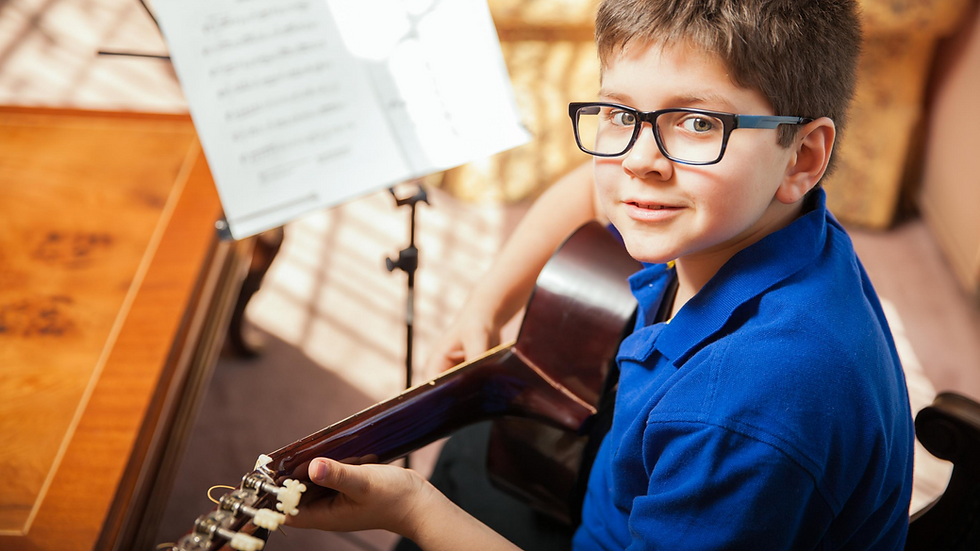If children are better visual learners, then why the importance of learning to read music?
- Bryce Leader

- Sep 16, 2020
- 3 min read
Reading music is difficult. Reading music requires analysis, thought and concentration. Playing a piece of music requires children to process and decode the pitch and duration of many notes many times as well as making sure that posture, hand positions and dynamics are correct. It’s a lot all at once!
As a music teacher, how often have you struggled to teach your students something like Mary had a little lamb? This is a song that contains notes of only four different pitches and three different rhythmic figures. It should not be hard to learn, but it is. How often do you write the names above the notes out of frustration only to find that your student still doesn’t read the notes but the letters instead?
When you also think about the many famous, creative, and talented musicians that cannot read a note, why bother teaching a child to learn to read music at all? Do they really need to learn to read music at a young age?
This is a question that is common amongst guitar teachers. In my experience, most guitar teachers like to use tablature and only play the latest songs and riffs but perhaps there is room in student lessons for both formal and informal learning?
Let’s have a look at a few reasons why teaching your students to read music is a good idea.

Speaking, Reading and Writing - The Communication Package
Everyone knows the importance of being able to read and write words. The ability to communicate verbally is important but so is recording your thoughts and reading those of others. Imagine how disadvantaged you would be if you could not read and write. These are necessary skills within our society. Yes, we can record and playback electronically but the ability to read and write generally forms part of society's overall communication package. If your students are learning to play music how then is not reading music even an option? Learning music is like learning a language and reading music is an equally important part of the overall musical package.
The Signs and Symbols of Written Music Convey a Great Deal of Information
Written music tells the reader not only how high or how low to play a note but also when to play it. Tablature, the alternative to written music for guitarists, is easier to understand initially but a student must still decode the string and correlate the number with a fret. The advantage of written music is that it can be understood and played without having to be familiar with the sound of the note first as there are generally no rhythmic figures associated with tablature.
You Are a Better Communicator with Other Musicians
If musicians all speak the same language, then communication is not a problem. There is an anecdote of a now famous guitarist unable to back a singer because she used charts. Each member of the band was handed their part but he had to stop the rehearsal and explain that he could not read music. He kept the job but only because he sought the services of a classical guitarist who could read music. He then learnt his part by memory.
If You Can Read Music – It's Just The Beginning!
People who read music (with a little training) can hear the music in their head when they read a score. They can look at a piece of music and sing it. They find that the instrument that they first learnt was only a tool, a mechanical device for reproducing music from the composer’s imagination. People who read music are often multi instrumentalists, can sing in choirs and are able to notate an idea or phrase they may have in their head, away from the instrument.
Understand the Works of Great Composers and Make It Yours
How satisfying is it to be able to get inside the head of a great composer perhaps long dead and know what they were thinking? How satisfying is it to open a Bach prelude and extemporise in a direction that he may not have considered? It’s so wonderful to be able to analyse a chord progression, play with it and make it your own.
For most students, learning the guitar will only ever be a hobby. But as teachers, shouldn’t we want the best for our students? Shouldn’t we be giving them the tools they need to be the best that they can be? Perhaps they only want to play the latest riffs but unless you can help expose them to generations of fine music, the latest riffs may be all they ever aspire to.
I believe it is our job as teachers to open our students minds to possibilities and through learning to read music, the possibilities are endless.
Author: Bryce Leader

Bryce is a teacher trained conservatorium graduate who has been teaching guitar since 1978.





Comments